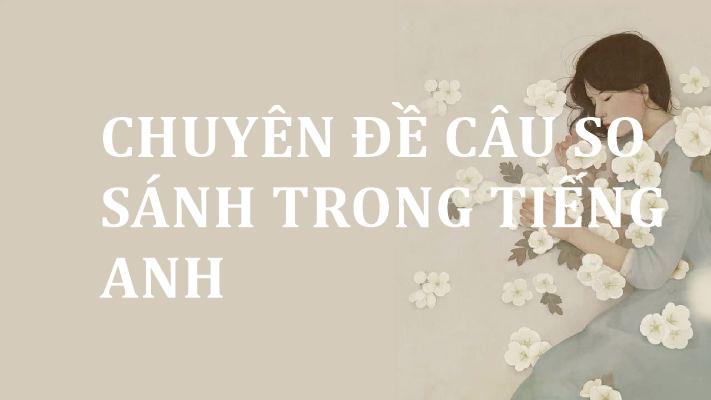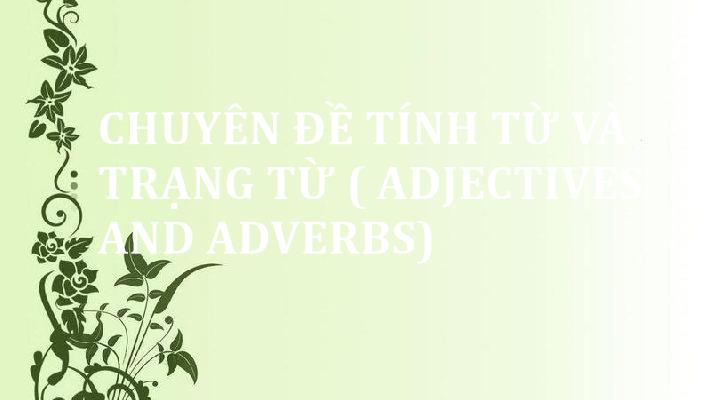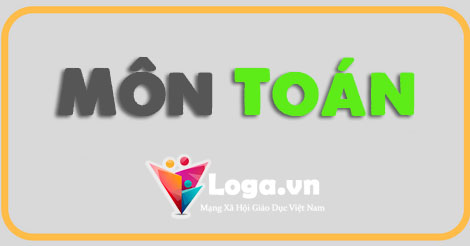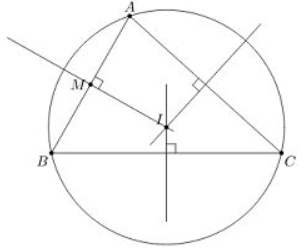CHỦ ĐỀ: QUANTIFIERS AND DISTRIBUTIVES
(TỪ CHỈ SỐ LƯỢNG VÀ TỪ CHỈ SỰ PHÂN PHỐI)
I: NHỮNG ĐIỀU CẦN BIẾT:
A: DANH TỪ ĐẾM ĐƯỢC VÀ DANH TỪ KHÔNG ĐẾM ĐƯỢC:
1.
DANH TỪ ĐẾM
ĐƯỢC: Thường là những danh từ có thể có
số đếm đứng trước nó được hoặc có thể thêm –s / –es cuối từ để tạo thành danh
từ số nhiều.
Ex: a dog → two dogs,
a pen → three pens, a box → four boxes, a leaf → five leaves, a
city
→ six cities, a watch → seven watches,....
Lưu ý: Cũng có
những danh từ đếm được số nhiều nhưng không có –s/-es chẳn hạn cuối như: men, women, children, people, cattle, oxen,
poultry, geese, mice, lice, feet, teeth,…
2.
DANH TỪ KHÔNG ĐẾM ĐƯỢC:
Thường là những danh từ không có số đếm
đứng trước nó được và cũng không thể thêm –s / –es cuối cùng khi nói đến ở “số nhiều”. Bên cạnh đó, danh từ không đếm được còn được xem là danh từ số ít. Do
đó, khi danh từ không đếm được làm chủ từ thì
động từ được chia với nó phải ở số ít (tức
là pahi3 thêm –s/es cuối động từ khi chia ở số
ít).
Ex: money,
means, food, rice, tea, salt, meat, bread, cheese, coffee, milk,
butter, sugar, water, pepper, deer, sheep, fish, air, clothing, furniture,
equipment, silver, jewelry, transportation, traffic, luggage, machinery,
housework, homework, information, knowledge, intelligence, music, pottery,
luck, happiness, fun, enjoyment, progress, honesty, sadness, poverty,
advice, courage, evidence, scenery, postage, violence,
jealousy, significance, …
Lưu ý: Các từ như food,
meat, cheese, progress, scenery thỉnh thoảng có thể được dùng như một
danh từ đếm được khi nó nói đến LOẠI thức
ăn, thịt, phô mai, ….
3.
CÁC THUẬT NGỮ VÀ KÝ HIỆU DÙNG TRONG BÀI NÀY:
- COUNTABLE NOUN: DANH TỪ ĐẾM
ĐƯỢC, ký hiệu là NOUNCOUNT
- UNCOUNTABLE NOUN/ NON-COUNT
NOUN: DANH TỪ KHÔNG ĐẾM ĐƯỢC, ký hiệu là NOUNUNCOUNT hoặc NOUNNON-COUNT
- Plural:
số nhiều, ký hiệu là pl.
- Singular: số ít, ký hiệu là sing.
B: TỪ CHỈ SỐ LƯỢNG VÀ TỪ CHỈ SỰ PHÂN PHỐI (QUANTIFIERS and
DISTRIBUTIVES)
1.
ENOUGH: (ĐỦ)
a.
ENOUGH + NOUN:
Ex: She doesn’t have enough money to buy that air plane. I
don’t have enough books to read.
There are enough attendants to begin their
meeting. Our crop doesn’t have enough
rain to grow well.
b.
ADJECTIVE / ADVERB + ENOUGH
Ex: She is not tall enough to reach that high shelf case. Nam doesn’t run fast enough to catch the dog.
I am not intelligent enough to do all those
difficult exercises.
We can do
those exercises quickly enough for
the teacher’s requests.
2. FEW (OF), LITTLE (OF) VÀ A FEW (OF), A LITTLE (OF): (ÍT VÀ MỘT ÍT)
a.
FEW (OF),
LITTLE (OF): ÍT: Mang ý nghĩa tiêu cực (Tức là có mà là có ít, có không đủ hoặc có không đáng kể).
a1: FEW (OF) + NOUNCOUNT + PL
Ex: I have very few
books to read.
We have few people
to do this hard work. Few of my students are very excellent. a2:
LITTLE (OF) + NOUNUNCOUNT
Ex: I have very little knowledge about this problem. There is little money in my wallet.
We only have little
sugar left.
a3. LITTLE (OF) còn đi với các động từ chỉ sự nhận thức như KNOW,
UNDERSTAND, RECOGNIZE, … với ý nghĩa là ÍT đã nói bên trên.
Ex: I know very little about
this problem. I understand little about
this problem.
b.
A FEW (OF),
A LITTLE (OF): MỘT ÍT: Mang ý nghĩa tích cực (Tức là có, có một ít, nhưng có
ít, có với số lượng nhỏ hay có mà không đủ nhiều)
b1. a few (of) + NOUNCOUNT + PL
Ex: I have a few books to read.
We have a few people to do this hard work.
A few of my students are very excellent.
b2. a little
(of) + NOUNUNCOUNT
Ex: I have a little knowledge about this problem. There is a little money in my wallet.
That patient
needs a little of water to drink.
There is a little of water in this
teapot.
b3. a little (of) còn đi với các động từ chỉ sự nhận thức như know, understand, recognize, … với ý
nghĩa là MỘT ÍT đã nói bên trên.
Ex: I know a
little about this problem.
I understand a little about this problem.
3. MANY (OF), MUCH (OF): (NHIỀU)
a.
many (of) + NOUNCOUNT + PL
Ex: I’m having many
things to do.
There are
not many people who need your helps.
Are there many things for you to do?
Many of my students are very mischievous.
b.
much (of) + NOUNUNCOUNT
Ex: I need much money to use for my plan. I don’t have much money for her to spend. Is there much water in the pot?
There is much of water needed.
There is too much
violence in Mexico.
c.
many và much được dùng trong câu
khẳng định, phủ định hoặc nghi vấn. Nhưng thường xuyên nhất là trong câu phủ
định và câu nghi vấn.
Xem các ví dụ
bên trên.
d.
many và much được dùng trong cấu trúc
….SO ….THAT…. hoặc sau TOO: Ex: There are so many stars
in the sky that I can hard count them
all.
He has so much money
that he knows nothing to do. He has too many things to do at the same time.
There is too many things for him to do at the
same time.
e.
much (of) còn được dùng với các động từ chỉ sự nhận thức như know, understand, recognize và động từ thank, …
Ex: I don’t know
much about this problem.
I don’t understand much about this problem.
Thank you very much for your help. There is nothing much to do today. Thanks so much!
4. HOW MANY VÀ HOW MUCH: (NHIỀU BAO NHIÊU/ BAO NHIÊU)
a.
How many + NOUNCOUNT +
PL + ……?
Ex: How many students are there in your class?
How many books do you have?
How many people are there in your family?
How many subjects are you studying?
b.
How much + (NOUNUNCOUNT) + ……?
Ex: How much water is there in your glass?
How much (money) do you have?
How much information do you need from me?
How much do you know about this problem?
5.
A GREAT NUMBER OF, A LARGE
NUMBER OF VÀ A GREAT DEAL OF, A LARGE AMOUNT OF, ALL (OF), MOST (OF), A LOT OF,
LOTS OF, PLENTY OF, SEVERAL (OF): (NHIỀU). Các cụm từ này thường chỉ dùng trong
câu khẳng định.
a.
a great number of / a large number of
+ NOUNCOUNT + PL
Ex: A great number of students have
careful preparations for their coming entrance exam. I have collected a large number of English exercises from
other colleagues.
b.
a great deal of / a large amount of + NOUNUNCOUNT
Ex: A great deal of time and money was spent on
his gambling. The new law met with a
great deal of opposition at local level.
c.
all (of), most (of), a lot of, lots of, plenty of, several (of):
được theo sau
bởi NOUNCOUNT + PL hoặc NOUNUNCOUNT
Ex: All cars have wheels.
All men are brothers. (Tứ hải giai huynh đệ)
Most of the sugar was used for cooking our meals.
We have a lot of things to do but we don’t have
much time left to finish them. Nam
has a lot of hot water for you to
make tea.
Plenty of students have joined the movement of
keeping our environment clean. They have spent plenty of time and energy on building skyscrapers.
All of this book is interesting.
All of these books are interesting.
Some of the animals from the Zoo were released
into the animal preserve.
Most of the people in America now are from
Europe.
Half of the food that we bought yesterday smells.
None of this money is mine.
No students in my class can play tennis as
well as John. No student in my class can play tennis as well as
John Most people want to be rich.
Many things can change.
Nhưng chúng ta cần chú ý sự khác nhau giữa 2 cách dùng sau:
All of the
flowers in
the garden are beautiful: tất cả hoa trong vườn đều đẹp. (có giới hạn)
All flowers are beautiful: tất cả các loài
hoa đều đẹp. (không có giới hạn)
Sở
dĩ có sự khác biệt khi có OF và không có OF là vì chữ OF lúc này mang nghĩa là
TRONG SỐ.
6. SOME, SOME OF VÀ ANY, ANY OF: (MỘT VÀI / MỘT ÍT VÀ BẤT KỲ)
a.
some, some
of: (một vài / một ít) theo sau bởi NOUNCOUNT + PL
hoặc NOUNUNCOUNT. Thường được dùng trong câu khẳng định và câu hỏi.
Ex: There are some
books on the table. Some of the
students are absent today. There is some sugar left in the pot.
That
patient insists on knowing some of the
information about his illness. Would you like some cheese for your breakfast?
How about some tea?
b.
SOME
(MỘT….NÀO ĐÓ) theo sau bởi NOUNSING. Ex: There is some dog barking outside.
I need some
paper to jot down his telephone number.
c.
Chữ SOME còn
có ý nghĩa là một số lượng rất lớn (dịch là “tới / đến những...”): Ex: We need some ninety-nine billion dollars for
our plan.
Some seven thousand students went on strike that day.
d.
SOME là đại từ, có nghĩa là MỘT VÀI, được dùng để thay thế cho SOME
+ NOUN mà NOUN đã được đề cập đến trước đó hoặc NOUN đã được ngầm hiểu.
Ex: My friends are playing in the school yard. Some are very friendly. Some are very strict.
e.
Any, any of:
(bất kỳ). Thường được dùng trong câu phủ định và câu hỏi. Ex: I need some cheese. Do you have any?
7. A PAIR OF + NOUNCOUNT + PL (một cặp…),
A COUPLE OF NOUNCOUNT + PL (một vài.….), A
GROUP OF + NOUNCOUNT + PL (một nhóm), A HERD
OF DOGS / CATTLE (Một bầy chó / Một đàn gia súc), A FLOCK OF BIRDS / SHEEP (Một
đàn chim / Một đàn cừu), A SCHOOL OF FISH (Một đàn cá), A SWARM OF BEES (Một
đàn ong), PACK OF WOLVES (Một bầy sói), COLONY OF ANTS (Một đàn kiến).
Ex: Yesterday, Mai bought a pair of shoes.
A couple of hours has passed, she must be on the way home.
A herd of cattle are / is gazing on the lawn.
8. SOMEONE, SOMEBODY, SOMETHING VÀ ANYONE, ANYBODY, ANYTHING:
a.
SOMEONE (Một
ai đó), SOMEBODY (Một ai đó), SOMETHING (Một điều gì đó): Thường dùng trong câu
khẳng định và câu hỏi nhất.
Ex: Listen! Someone is knocking at the door. Would you like something to eat?
Is there somebody
in your house?
b.
ANYONE (Bất
kỳ ai), ANYBODY (Bất kỳ ai), ANYTHING (Bất kỳ điều gì): Thường dùng trong câu
phủ định và câu hỏi nhất.
Ex: I don’t like anything you have just suggested. I don’t know anything about her.
Is there anything wrong?
9. SOMETHING VÀ SOME THINGS
a. SOMETHING: một điều / thứ gì đó. (số lượng bằng một) Ex: I’d like to have something to do now.
b.
SOME THINGS:
một vài điều / thứ gì đó. (số lượng lớn hơn một) Ex: I remember telling you some things about my plan.
Mary goes to the market to buy some things she needs.
| ||||||||||||||||||||||
| ||||||||||||||||||||||||||||||||||
EXERCISE 1: Choose the best answer to complete these
following sentences.
1. There is _______water in the bottle.
A. little B.
a few C. any D.
many
2. I have ______money, not enough to buy groceries.
A. a lot of B.
little C. any D.
many
3. I have ________money, enough to buy a ticket.
A. a lot of B.
little C. many D.
a little
4. She has _______books, not enough for references.
A. few B.
a few C. many D.
little
5. She has _______books, enough to read.
A. many B.
few C. a few D.
a little
6. There _______ traffic on
the street at rush hours.
A. are too many B.is
too much C. are too alot D.
are too little
7. He bought _______furniture
for her new apartment which she has bought recently.
A. many B.
few C. much D. a few
8. _________ the people I work with are very friendly.
A. some B.
some of C. a little of D. a few
9. _________these money is mine.
A. some B.
a few of C. many D.
none of
10. We didn’t spend
__________money
A. many B.
some C. much D. a few
11. There are _________people there.
A. too many B.
too a little C. too much D.too little
12. Do you know ________people in this neighbourhood.
A. much B.
a little C. many D.little
13. Would you like
_________to eat?
A. something B.
anything C.everything D.nothing
14. I can’t find it ___________.
A. somewhere B.
nowhere C.everyplace D.anywhere
15. I like him __________.
A. so many B.
any much C.so much D.so some
16. We must be quick. There
is ________time left.
A. much B.
many C.a lot of D. little
17. Let’s go and have a drink
we have _______time left.
A. much B.
a little C.a lot of D. little
18. There is a telephone in
_______room of the house.
A. every B.
each C.some D. A and B are correct
19. You should read
_______sentence carefully.
A. every B.
some C.many D. a lot of
20. _________ has right to
vote.
A. something B.
everyone C.many people D. some people
Key:
1A 2B 3D 4A 5C 6B 7C 8B 9D 10C 11A 12C 13A 14D 15C
16D 17B 18D 19A 20B







